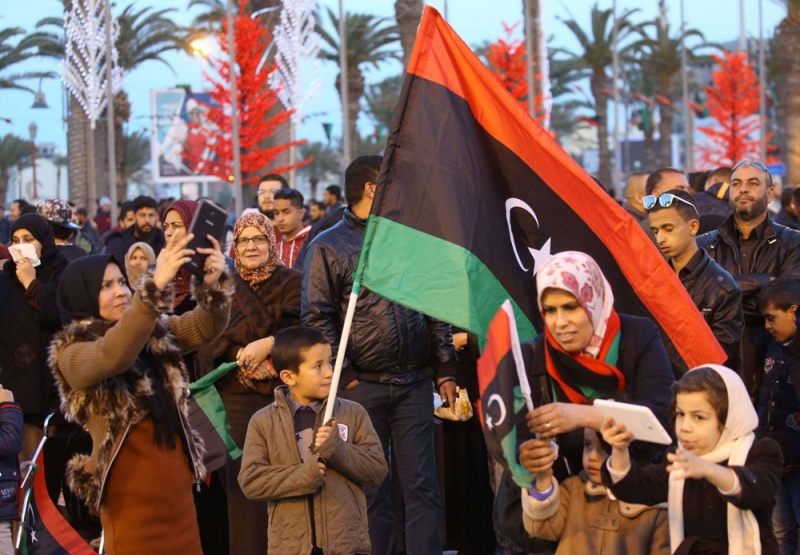Tobruk (Libya) – The promulgation of a constitution remains a difficult demand in Libya after the events that toppled the regime of the late Libyan Colonel Muammar Gaddafi.
Although the Sixtieth Commission finished writing the constitution in July 2017, after three years of tug of war among its members, a number of difficulties are still facing its promulgation.
The passage of the referendum bill is one of the main challenges facing the constitution.
Among the most prominent reasons that make voting on the bill difficult is the requirement that 120 deputies out of 200 vote in favor of the law, especially since the House of Representatives has been finding it difficult for many months to hold a plenary session (at least 101 deputies).
Although the Libyan media reported that 50 deputies from western Libya (most of them boycotters) went to Tobruk to attend the voting session on the bill, but MP Ziyad al-Daghim called on the deputies of the eastern region to boycott the voting session and not vote yes, so as not to obtain the described majority ; 120 votes specified by the Constitutional Declaration, approved by the Legislative Committee and the Presidency of the Council.
Not only the deputies of the eastern region are those who oppose the draft of the constitution, but there are calls from the Tebu tribes and Amazigh not to vote in favor of the draft constitution, because it does not include, in their view, their linguistic and cultural demands, not to mention the representatives demanding federalism in the Cyrenaica region.
Even if the referendum bill is passed, there is a final point that may make the approval of a permanent constitution for the country a very difficult issue, as it talks about dividing the country into four electoral districts (Tripoli, Cyrenaica, Fezzan, and abroad), and requires obtaining two-thirds of the votes in each region. To approve the constitution, and if we assume that the province of Cyrenaica, for example, voted less than two-thirds, then this will completely blow up the constitution and return the country to point zero.
On Monday, the Speaker of Parliament raised the session devoted to discussing the referendum bill, announcing the postponement of voting on it until Tuesday, due to disagreements over Article 8 of the bill.
Parliament spokesman Abdullah Belhaq said on Monday that the deputies discussed in today’s session 46 articles in the referendum law, in which some vocabulary or words were amended and agreed upon without any fundamental amendments.
Belhaq added in press statements that the remarks came only on Article 8, which was put up for discussion in the session.
The article stipulates that in the event that the constitution is rejected by the people, the constituent body is not considered responsible for amending it and presenting it again. The Council of Representatives is the one who will form a committee to draft the constitution within a maximum period of three months.
Belhaq explained that the session was suspended until Tuesday, so that the members of the House take their time to consult with the Legislative Committee in the House of Representatives, because in the case of approval of Article 8, approval of the law requires a constitutional amendment, indicating that if the draft constitution is rejected, then Article 8 means dissolution The constituent body, which contravenes the constitutional declaration.
Reactions varied before the start of the voting session on the referendum bill, as the United Nations mission welcomed the session and considered it a necessary step to establish fair elections.
The mission said in a tweet on Twitter that it “is closely following, with the international community, this democratic process to ensure a free and fair electoral process on the referendum law for the future and peace of Libya.”
On the other hand, the political advisor to the President of the Presidency Council of the Government of National Accord, Al-Taher Al-Sunni, warned that “issuing a flawed referendum law and consecrating the concept of regions into three departments, aimed at thwarting the project,” referring to voting according to the country’s historical regions (Cyrenaica, Tripoli and Fezzan).
“Is this the reconciliation that you are calling for?” Asked the political advisor to the President of the Presidency Council, stressing that “Libya is one constituency according to the constitutional declaration, and we will remain a single nation no matter what some of the political adolescents do.”
Al-Sunni’s post supports the expectations of some observers who believe that the draft will fall in the Cyrenaica region, whose residents are calling for the adoption of the federal system.
The referendum on the constitution in general is rejected by the trend calling for the necessity to hold elections before the end of this year, led by the National Army led by Field Marshal Khalifa Haftar and some political figures such as the former Libyan ambassador to the UAE Aref Nayed, who had previously announced his candidacy for the presidential elections, in addition to some loyalists to the Muammar regime. Gaddafi.
This trend derives from its refusal to hold the referendum before the elections, from the fact that the situation in the country no longer tolerates further division, especially in light of the deterioration in the purchasing power of citizens and the decline in services in exchange for high indicators of corruption.
The same trend affirms that the insistence on holding the referendum is nothing but an attempt by some of the beneficiaries to prolong the political crisis that negotiations have been unable to resolve over the past four years, led by the political Islam movement, which insists on issuing the constitution as a legal basis for holding elections.
Source : alarab.co.uk

